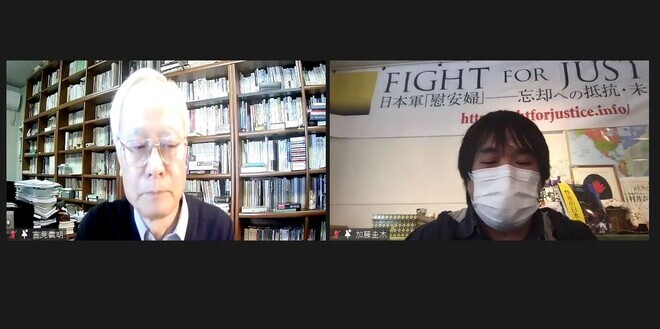hankyoreh
Links to other country sites 다른 나라 사이트 링크
Japanese “comfort women” expert says Ramseyer’s paper is riddled with problems

A recent academic paper by Harvard Law School professor J. Mark Ramseyer characterizing comfort women as prostitutes is “too riddled with problems to be acknowledged as an academic paper,” according to a Chuo University emeritus professor who is considered Japan’s foremost authority on the wartime military sexual slavery issue.
Professor Yoshiaki Yoshimi offered a point-by-point rebuttal of Ramseyer’s paper Sunday while taking part in an online seminar co-organized by Fight for Justice — a Japanese civic group that operates an academic site on the military sexual slavery issue — and several academic groups including the Japanese Society for Historical Studies, the Historical Science Society of Japan, the Association of Historical Science, and the History Educationalist Conference of Japan.
“Dr. Ramseyer’s paper ignores the important fact that the Japanese military and government created and maintained the comfort women system as an institution of sexual slavery,” Yoshimi said.
According to Yoshimi, “comfort station” operators were subordinate to the military and were unable to even decide the rates charged at their establishments.
He also pointed to copious evidence and research showing that the comfort women themselves could not be parties to the contracts, which meant that even if contracts did exist, the system amounted to human trafficking.
Despite this previous research, Ramseyer claimed in his paper that operators and comfort women entered into contractual relationships, with each party asserting their respective interests.
“In his paper, Ramseyer does not present a single piece of evidence to support his claim [that the comfort women were voluntary sex workers], and there are some things that he appears to have simply made up,” Yoshimi said.
“The biggest flaw is that it disregards the enormous human rights violations suffered by the comfort women as victims of a sexual slavery system,” he added.
In 1992, Yoshimi discovered the first documentation showing the Japanese military and government’s close involvement in creating the comfort women system. This would go on to influence a 1993 statement by then-Chief Cabinet Secretary Yohei Kono, in which the Japanese government acknowledged the coercive nature of the women’s mobilization.
Akane Onozawa, a Rikkyo University professor who has studied Japan’s modern factory system and the Japanese military’s comfort women system, also blasted Ramseyer’s work as “failing to meet the requirements of an academic paper.”
“Most of the women enlisted as ‘comfort women’ in colonies and regions occupied by the Japanese military were recruited through means such as violence, fraud and human trafficking by the Japanese military itself or by operators acting on orders from the Japanese military,” she said.
Other seminar attendees who raised issues with Ramseyer’s work included National University of Singapore professor Sayaka Chatani, Osaka Sangyo University professor Takeshi Fujinaga and University of Toronto professor Lisa Yoneyama.
By Kim So-youn, staff reporter
Please direct comments or questions to [english@hani.co.kr]

Editorial・opinion
![[Editorial] Penalties for airing allegations against Korea’s first lady endanger free press [Editorial] Penalties for airing allegations against Korea’s first lady endanger free press](https://flexible.img.hani.co.kr/flexible/normal/500/300/imgdb/original/2024/0502/1817146398095106.jpg) [Editorial] Penalties for airing allegations against Korea’s first lady endanger free press
[Editorial] Penalties for airing allegations against Korea’s first lady endanger free press![[Editorial] Yoon must halt procurement of SM-3 interceptor missiles [Editorial] Yoon must halt procurement of SM-3 interceptor missiles](https://flexible.img.hani.co.kr/flexible/normal/500/300/imgdb/child/2024/0501/17145495551605_1717145495195344.jpg) [Editorial] Yoon must halt procurement of SM-3 interceptor missiles
[Editorial] Yoon must halt procurement of SM-3 interceptor missiles- [Guest essay] Maybe Korea’s rapid population decline is an opportunity, not a crisis
- [Column] Can Yoon steer diplomacy with Russia, China back on track?
- [Column] Season 2 of special prosecutor probe may be coming to Korea soon
- [Column] Park Geun-hye déjà vu in Yoon Suk-yeol
- [Editorial] New weight of N. Korea’s nuclear threats makes dialogue all the more urgent
- [Guest essay] The real reason Korea’s new right wants to dub Rhee a founding father
- [Column] ‘Choson’: Is it time we start referring to N. Korea in its own terms?
- [Editorial] Japan’s rewriting of history with Korea has gone too far
Most viewed articles
- 160% of young Koreans see no need to have kids after marriage
- 2Months and months of overdue wages are pushing migrant workers in Korea into debt
- 3[Editorial] Penalties for airing allegations against Korea’s first lady endanger free press
- 4[Reporter’s notebook] In Min’s world, she’s the artist — and NewJeans is her art
- 51 in 3 S. Korean security experts support nuclear armament, CSIS finds
- 6Bills for Itaewon crush inquiry, special counsel probe into Marine’s death pass National Assembly
- 7[Guest essay] Maybe Korea’s rapid population decline is an opportunity, not a crisis
- 8Cracks found in containment building of UAE nuclear power plant built by S. Korean companies
- 9S. Korea discusses participation in defense development with AUKUS alliance
- 10[Special report- Part I] Worked to death at the ripe age of 22